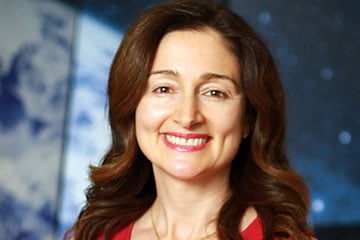
Catherine Lacavera says she wanted a career from a young age that would encapsulate her passions for business, technology and law.

Catherine Lacavera says she wanted a career from a young age that would encapsulate her passions for business, technology and law.
Now, the Canadian expatriate is doing exactly that in the Greater San Francisco area of California, running a large legal department of about 150 employees at multinational tech giant Google.
As vice president of legal for Google, Lacavera runs the company’s global litigation, employment, discovery and regulations teams.
Her day-to-day work covers the company’s priorities at any given time, from knowing what legal changes there are in various jurisdictions that might impact Google’s business to dealing with major IP-related legal battles.
“There are cases where we’re fighting for freedom of the internet, free speech around the world [and] accessibility of information. Fighting for these lofty principles sometimes comes at a great cost to us,” says Lacavera.
She points to the now-resolved Viacom case, where the company alleged YouTube (owned by Google) had engaged in copyright infringement by allowing users to upload and share content owned by the company without permission. Ultimately, the judge ruled in YouTube’s favour, as the subsidiary was shielded by provisions from the Digital Millennium Copyright Act.
“We spent over $100 million fighting the Viacom case, fighting for user-generated content on the web. It is a great privilege and awesome responsibility to be granted resources to put toward defending the internet,” she says.
Lacavera attended the University of Toronto, where she received her undergraduate degree in engineering in 1997 and her JD/MBA degrees in 2001, as well as an honorary law doctorate from the university in 2017.
Lacavera says she knew from an early age that she wanted to be an intellectual property lawyer and to work in a corporate legal department. Looking back, she says, her law school admissions essays were even about her desire to work at the intersection of law, technology and business — her three areas of study.
Her background in engineering gave her a strong foundation to be part of this field, she says.
“I think engineering is an excellent foundation for any field of endeavour. You learn these tools and skills and ways of breaking down problems into digestible parts and developing scalable solutions that are useful in any field,” says Lacavera.
“I’ve dealt with more than 1,000 patent lawsuits and tens of thousands of defamation cases. To be able to do that at scale without constantly adding more people requires a bit of an engineering way of thinking of things, creating optimizations and reusable work product.”
In 2001, she moved from Toronto to New York City to practise at White & Case LLP as an intellectual property associate, where she remained for four years. Lacavera says her time in private practice helped arm her with both hard and soft skills to lead her large legal team at Google.
She says the training and guidance provided by experienced partners is useful for young lawyers before making a move to an in-house position.
“Having experience growing up at a major law firm, being trained and having the mentorship and experience of working on high-risk cases is really formative for young attorneys,” she says.
In 2005, Lacavera joined Google. She says she was drawn to the technology sector because of her background in computer engineering. Her previous role involved work in the pharmaceutical industry.
She says the scope of Google’s legal work is broad, and even with a large in-house legal department working on thousands of active cases, some of the work needs to be outsourced to external legal counsel. Google conducts business globally, says Lacavera.
She says she is involved in the recruitment process of external legal counsel for the company, and she will fly out to meet potential hires to ensure they’re the right fit for the legal team.
“[W]e have thousands of active cases at any given time, so that’s employing a vast army. I spend a lot of time doing that,” says Lacavera. “I was in Munich for a while, where we had a ton of patent litigation, and I went and lived there, and spent time meeting counsel on the ground there because I do think to understand a jurisdiction requires quite a time commitment.”
Although Lacavera’s career at Google has taken her around the world, she still maintains strong ties with her roots in Canada and with her alma mater, the University of Toronto.
She frequently participates in speaking engagements at the university and remains a mentor to students through its various startup incubators and student groups, such as the Women in Science and Engineering group.
She also served on the Canadian government’s Venture Capital Catalyst Initiative committee starting in 2018, which aims to “fund and improve the venture ecosystem.” She says the venture capital and startup communities have come a long way from when she was in school.
“When I was studying at the University of Toronto, I would do an assignment and would hand it in, get my A, throw it in a drawer and forget about it, never thinking to turn it into a company,” she says. “The Canadian venture ecosystem has come so far from when I was [a university student], and I’m really excited about the future.”
Lacavera is participating in one of Google’s largest lawsuits, a copyright law case between the company and Oracle. She is currently waiting to hear if it will head to the Supreme Court of the United States.
“I am very lucky to work at a company that has a moral compass and where I can genuinely stand up every day and feel like the cases that I’m fighting for and defending are not just good for Google but good for the world,” says Lacavera. “I absolutely love my job.”